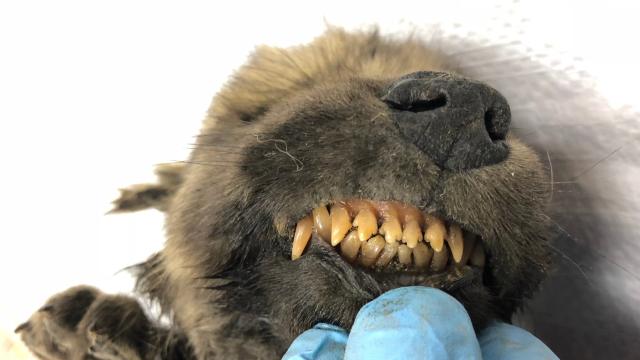The DNA of an exquisitely preserved puppy found in Siberia doesn’t appear to fit the profile of a dog or a wolf, which means the specimen might be something in between.
The frozen puppy, found near Yakutsk in eastern Siberia, was just two months old when it died, reports CNN. Scientists from the Centre for Palaeogenetics—a joint project between Stockholm University and the Swedish Museum of Natural History—used radiocarbon dating on its rib bone to place its brief time on Earth to 18,000 years ago, during the tail end of the last Ice Age.
The level of preservation is unreal, with the puppy still exhibiting intact teeth, nose, and fur. Scientists were able to extract DNA from the specimen, allowing them to confirm the pup’s sex as male. It has since been named “Dogor,” which means “friend” in Yakutian.
As to which species this animal belonged is now an intriguing question, as the DNA analysis was inconclusive. The little critter doesn’t seem to fit the genetic profile of a dog or a wolf, and it quite possibly represents an intermediary stage during the domestication of dogs.
“We have a lot of data from it already, and with that amount of data, you’d expect to tell if it was one or the other,” David Stanton, a researcher at the Centre for Palaeogenetics, told CNN. “The fact that we can’t might suggest that it’s from a population that was ancestral to both—to dogs and wolves.”
Here is another amazing find from the Belaya Gora site!
Radiocarbon dating says it 18,000 years old.
Question: is it a #wolf cub, or possibly the oldest #dog ever found?
We are hoping to answer this by sequencing it’s genome (it has 43% endogenous DNA).
But what do you think? pic.twitter.com/MTZ918GFBf
— Love Dalén (@love_dalen) April 16, 2019
It’s a fascinating possibility, but it’s important that we not jump to conclusions. The specimen could very well be an ancestral wolf. If it is a dog, however, it would likely represent the oldest in the archaeological record. The current record holder is the Bonn-Oberkassel dog, dated to around 14,223 years old. The incomplete remains of this ancient domesticated dog were uncovered in a basalt quarry near Bonn, Germany in 1910.
The origin of dogs is still not completely clear, hence the importance of the new discovery. The first domesticated dogs emerged in Asia around 14,000 to 16,000 years ago, but genetic evidence suggests the divergence date between dogs and ancient wolves happened at some point between 20,000 to 40,000 years ago. To complicate matters, dogs may have been domesticated twice, once in Asia and once in Europe.
That the newly discovered puppy is some kind of evolutionary missing link is wholly plausible, as the timing appears to be right. But more evidence is needed. To that end, the researchers at the Centre for Palaeogenetics are planning to perform more tests on the specimen to fully elucidate its genetic constitution and get a better handle on the species to which it belonged.
